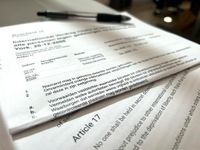In a shocking revelation, the Inspectie Justitie en Veiligheid has concluded that lawyer Inez Weski was unlawfully held in a secret location for nine days following her arrest in April 2023. This finding stems from an investigation prompted by Weski's own book, where she detailed her harrowing experience during her detention. The inspection's report indicates that Weski was taken to an undisclosed site that lacked proper oversight, violating both Dutch law and international treaties.
Weski, a prominent criminal defense attorney, was arrested on suspicion of participating in the criminal organization led by Ridouan Taghi, a notorious figure in international drug trafficking and money laundering. The Public Prosecution Service alleges that Weski transmitted over 8,000 messages between Taghi and his associates, including his son, while Taghi was incarcerated in the Extra Beveiligde Inrichting (EBI) in Vught. The gravity of these allegations has placed Weski at the center of a high-profile legal battle.
According to the inspection, Weski was held in what was described as an underground bunker at the Soesterberg airbase. The report notes that the authorities were unaware of her location for the duration of her detention. This lack of transparency raises serious concerns about the conditions under which she was held, as there were no established guidelines or oversight mechanisms in place. Weski was reportedly not informed about whom to address her complaints to, and there were no house rules governing her treatment.
The inspection emphasized that while security measures are sometimes necessary to protect prison staff and inmates, they must not extend to secret detention. "Such measures should not be so extensive that they result in secret detention," the report stated. It also acknowledged that there was some attention to Weski's well-being during her confinement, but this does not mitigate the violation of her rights.
Weski's book, titled "Het geluid van de stilte" (The Sound of Silence), recounts her experience of being isolated in a cell, which she described as being "almost airtight and buried deep underground." She expressed fears that the authorities intended to "neutralize" her, reflecting the psychological toll her detention took on her. The narrative she presents is one of profound distress, as she felt cut off from the outside world and feared for her life.
Following her nine-day ordeal, Weski was transferred to the women’s prison in Nieuwersluis, where she remained in solitary confinement. Her trial began earlier this year, and she has maintained her commitment to the confidentiality obligations that exist between attorneys and their clients.
As the legal proceedings unfold, Weski's defense team, including lawyers Geert-Jan and Carry Knoops, have opted to withhold comments on the inspection's findings until the next court hearing. This preliminary hearing is scheduled for Thursday, April 10, 2025, where they plan to address the implications of the inspection’s report on her case.
The Public Prosecution Service has dismissed Weski's claims about her unlawful detention as "total nonsense" and "quatsch." Rinus Otte, the head of the Public Prosecution Service, previously stated that the allegations are unfounded and that the judicial system operates with high standards of oversight and accountability. He emphasized that a judge would not have legitimized an illegal or torturous situation during a preliminary hearing, suggesting that such claims undermine the integrity of the judicial process.
In light of the inspection's findings, Weski has expressed relief that her claims have been validated, stating, "After two years of fruitless attempts to bring attention to the underground bunker where I was buried alive, this inspection report finally confirms what occurred there in violation of the law and international treaties." She hopes that the revelations will lead to a reassessment of the Public Prosecution Service's actions in her case.
The inspection's report has prompted discussions about the legal implications of secret detention practices in the Netherlands. While it acknowledges that such measures may sometimes be necessary for security, it firmly states that they cannot violate fundamental rights. The inspection has since established new agreements with the Dienst Justitiële Inrichtingen (DJI) regarding oversight in similar situations to prevent future occurrences of unlawful detention.
As the legal proceedings continue, the focus will remain on the implications of these findings for Weski's trial and the broader impact on the judicial system in the Netherlands. The upcoming hearing on April 10 will likely address the defense's requests for further investigations and may shape the trajectory of Weski's case.
In summary, the case of Inez Weski underscores significant concerns regarding the treatment of detainees and the adherence to legal standards in the Netherlands. As the investigation unfolds, the legal community and the public will be watching closely to see how these revelations influence the judicial process and the accountability of the authorities involved.







